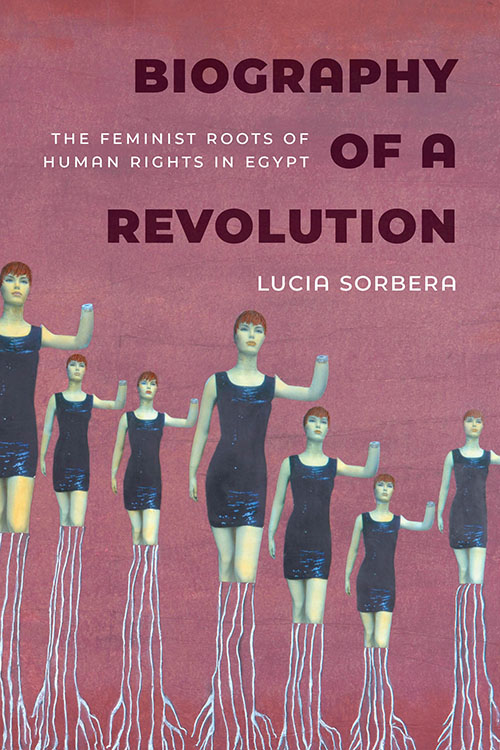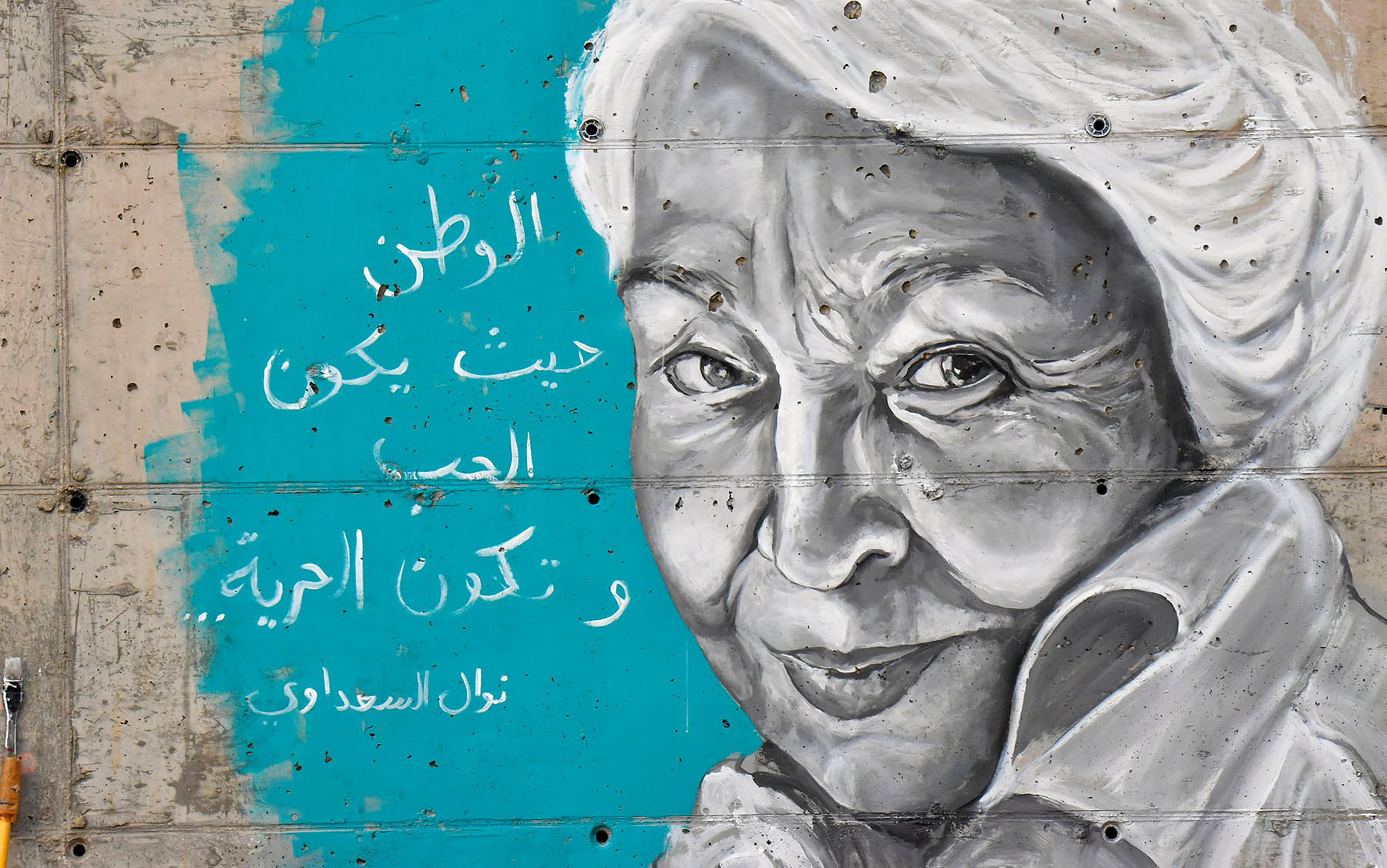It is not Egypt’s 2011 revolution that opened a space for women’s and feminist activism, but — as Lucia Sorbera’s new book shows — the long history of women’s activism that created the intellectual and political background for revolution.
Biography of a Revolution: The Feminist Roots of Human Rights in Egypt
By Lucia Sorbera
UC California Press 2025
ISBN 97805200394759
Jasmin Attia
At my first book reading for The Oud Player of Cairo, I was interviewed in front of an audience, by an author who asked me about the Egyptian feminist movement that began in the early 20th century, and how it influenced the development of my main character. I touched on a few important feminists like Hoda Sha’arawi, Nawal El Saadawi, and Doria Shafik, talking about the long road they traveled and the current struggles of Egyptian women against a prevailing patriarchy. Egyptian women were not alone; women were fighting some form of a patriarchy worldwide. Applause followed.

Later, when I was signing books, the husband of a friend congratulated me and said, “Well done, but take it easy on the patriarchy, will you?” I laughed it off, but his comment stuck with me. Did he feel that the patriarchy deserved defending? His words haunted me, and they returned as ghosts often do when I was reading Biography of a Revolution by Lucia Sorbera, which exposes in no uncertain terms just how oppressive the patriarchy has been, and the lengths to which women had to go to attain rights as simple bodily autonomy, access to certain careers, or freedom from genital mutilation.
Biography of a Revolution analyzes the feminist roots of human rights in Egypt and thoroughly examines the unique challenges of Egyptian feminism as it faced an authoritarian regime, religious dogma, and a legal system that for centuries shut women out. Sorbera reframes the history of Egyptian feminism within the context of two revolutions in which women played a major role, one in 1919 against British occupation and the other in 2011 against an autocratic government. These revolutions have often been seen as the fortuitous opening of spaces for women’s political activism. The book raises a new question, “What if it was not the revolution that opened new spaces for women’s political activism but rather the long history of women’s and feminist activism that helped create the space for the explosion of the 2011 Revolution and its evolution into a women’s revolutionary decade?”
Between 2011 and 2023, Sorbera, an Associate Professor and Chair of Arabic Language and Cultures at the University of Sydney, collected and documented sixty-four oral histories, as well as a vast body of written documents. Certainly, it read like a biography, but for me the Biography of a Revolution took on a deeper meaning. It was akin to a study of the anatomy of Egyptian feminism, each part of the greater body having had a specific impact and role affecting the entire entity. Sorbera traces this body meticulously and describes the movement through multiples lenses: feminism as human rights activism, bodily rights, rights within the family unit, rights to healthcare, and LGBTQ rights.
Egyptian feminism is not a footnote to revolution—it is its foundation. Lucia Sorbera’s Biography of a Revolution traces the untold stories of women who risked everything to transform a nation.
While the fight for women’s bodily rights is not unique to Egypt, the arduous struggle against female genital mutilation (FGM) and the notions on which it is predicated has been. Sorbera illuminates the work of many feminists who spent large portions of their careers on the effort to end FGM, among them Marie Assad, Seham Saneya Abd El-Salam, and Nawal El Saadawi. During Sorbera’s interview with Abd el-Salam, she details her experiences:
“People call it tahara…purity…So, when I speak to them, I use their language, and at the very end I try to discuss the thing and I say: ‘So, is this tahara, after all you said? They say, ‘NO!’ ‘So, what is it?’ ‘It is torture, it is mutilation.’ I don’t start speaking about genital mutilation, no, no.”
Sorbera discusses the paradox of modernity relative to female circumcision, asserting that there was an inverse relationship between a woman’s mobility and existence in public spaces like universities and workplaces and the a “moral panic about sexual promiscuity.” Thus, a doubling down on the the need to quell a woman’s sexuality by excising the parts of her body thought to be the source of desire.

Another pillar of the Egyptian feminist movement discussed in the book is the fight for institutional reforms to an archaic set of laws called the Personal Status Law: “a series of legal provisions to regulate family matters (especially marriage, divorce, and inheritance) and inspired by shari’a.” Since the early 1920s Egyptian feminists have been pushing for access of women to the legal professions. Decades later, in the year 2000, a network of women lawyers having diligently worked to speed along progress, succeeded in getting a New Marriage Contract form issued in which a woman was allowed to unilaterally end a marriage — a right that did not exist before the year 2000. This was resisted by the “prevailing patriarchal culture.”
Egyptian feminism has been often mischaracterized and misunderstood, but Sorbera delivers on her promise to educate her readers. She delves into the nuances of the movement, credits the women who advanced it, and details how these actions set the stage for the 2011 revolution. In several sections Sorbera discusses how many of these women over the decades were imprisoned several times for their activism. Throughout their journeys some have paid the ultimate price, having been tortured or killed. Nawal El Saadawi, for example, was imprisoned by President Sadat for her outspoken and writings, particularly her book Women and Sex, which was banned in 1972 three years after it was published, though it was a widely read and appreciated during that time.
Today Egyptian women continue to raise awareness and promote change. Tens of organizations and thousands of volunteers build on the past century of Egyptian feminism. Some examples include the Center for Egyptian Women’s Legal Assistance cofounded by Azza Soliman, an Egyptian lawyer and women’s rights activist, #SpeakUp, a feminist initiative on social media supporting victims of violence, and Assault Police, an Instagram page campaigning against the Personal Status Law and advocating for women’s rights.
Under President El Sisi there has been a spike in women’s political participation, with women making up close twenty 25% of the cabinet and parliament. The regime has also passed laws in favor of women in areas of sexual harassment, genital mutilation, and inheritance. However, the criticism, according to the Tahrir Institute for Middle East Policy, is that the regime is “feminist washing” by pushing a selective implementation of feminist ideals to cover a worsening human rights record. Nonetheless women have seen some progress albeit under an authoritarian regime. Egyptian feminists have much work to do, but as Sorbera details in her book, they are not backing down. For anyone interested in history of their struggle, Biography of a Revolution is essential reading.






